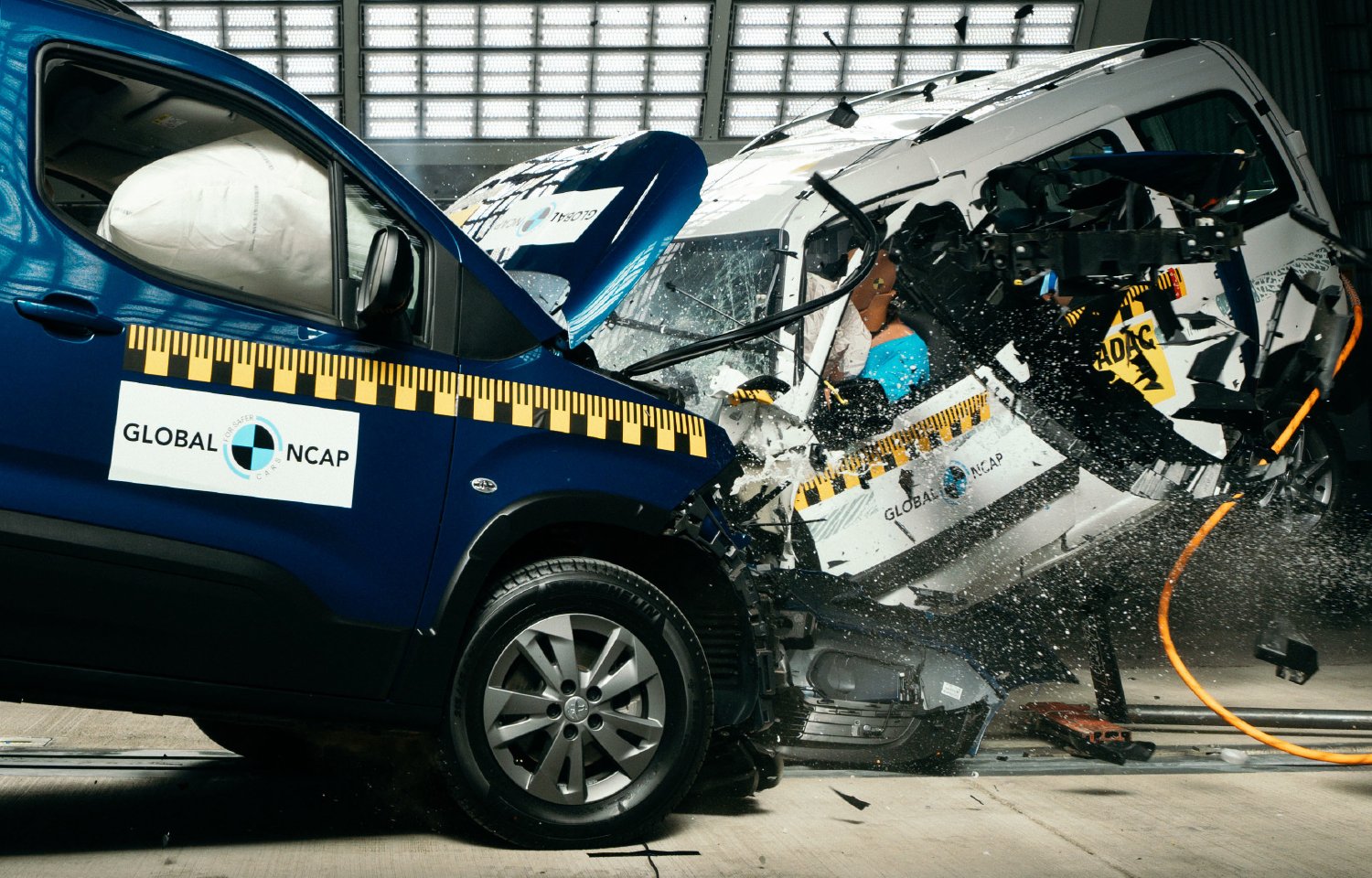Latest Car to Car Crash test demonstrates ‘zero star’ double standard on safety
In the latest Latin NCAP and Global NCAP car to car campaign, the Peugeot Partner Patagónica, purchased anonymously in Argentina, and the Peugeot Rifter, bought anonymously in Chile, were put to the test. Both cars are sold as new and comply with local regulations, but the twenty-five-year-old Partner Patagónica model lacks many basic protecting safety features. The test demonstrates the dramatic ‘zero star’ double standard adopted in the Latin American region by some car manufacturers, in this case in two neighbouring markets.
Watch Car to Car test video: https://youtu.be/8hYpnZleQHM
The Peugeot Partner Patagónica, is produced in Argentina with only two frontal airbags and Electronic Stability Control (ESC) as standard. The model was developed and first produced in the late nineteen nineties. The Peugeot Rifter, which aims to replace the Peugeot Partner, is produced in Europe and offers 6 airbags and ESC as standard.
The protection that the Rifter offered to the medium size adult driver during the crash test was good in the head and neck and adequate to the chest showing a stable structure, while the Partner Patagónica driver showed poor protection to the chest and neck and marginal to the head and an unstable structure. The driver dummy of the Partner Patagónica, which showed life threatening injuries, prevented the structure to deform further. The small female passenger dummy protection in the Patagónica showed marginal protection to the chest and a concerning weak neck protection, while the Rifter showed marginal protection to the small female passenger dummy chest.
The Partner Patagónica Child Restraint Systems (CRS) were installed using the seatbelts showing poor protection for the 3 years old dummy and marginal and weak protection to the neck and chest respectively of the 1.5 years old dummy. The Rifter showed full protection for the 1.5 years old dummy and limited to good protection to the 3 years old dummy with CRSs installed using ISOFIX anchorages and facing rearwards.
The result of the Partner Patagónica would have led to a zero stars in a Latin NCAP and Global NCAP assessments.
Alejandro Furas, Global NCAP Secretary General said,
“This alarming result of a car developed over 25 years ago and still sold as new in Argentina, calls into question Peugeot’s leadership on safety worldwide. At the time when global corporate standards aim to prevent investing business where human rights are not respected, it is time for Stellantis’ Shareholders to consider a similar scenario as human rights in terms of safety are not followed. We hope that this test is a wakeup call to consumers, regulators and car manufacturers. All consumers, no matter where they live or how much they pay, have the right to receive the same standard safety in cars. This safety gap should no longer exist. We call on Stellantis and other manufacturers to stop with double standard strategies in the world.”
David Ward, Towards Zero Foundation Executive President said,
“Presenting a decades old design, with low levels of safety performance, as being a new model is entirely unacceptable. Calling out this double standard will help consumers see through the marketing hype and put the spotlight on the Peugeot and Stellantis leadership to address this startling safety discrepancy. Playing fast and loose with vehicle safety across Latin American markets must come to an end.”
About Latin NCAP
The Latin New Car Assessment Programme (Latin NCAP) was launched in 2010 to develop a regional system of independent crashworthiness and safety rating across Latin America and Caribbean (LAC). Latin NCAP replicates similar consumer testing programmes developed over the last thirty years in North America, Europe, Asia and Australia, and which have proved to be very effective in improving the safety of motor vehicles. Since 2010 Latin NCAP has published the results of more than 150 models, all results available at www.latinncap.com/results.
Latin NCAP acknowledges the support received by the Global New Car Assessment Programme (Global NCAP), International Consumer Research and Testing (ICRT), FIA Foundation, the Inter-American Development Bank (IDB) and Bloomberg Philanthropies Global Road Safety Initiative. Latin NCAP is an Associate member of Global NCAP and supports the United Nations Decade of Action for Road Safety and the Stop the Crash Partnership.
More info: www.latinncap.com






